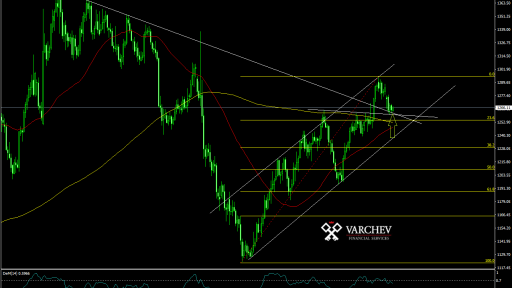- Home
- >
- Stocks Daily Forecasts
- >
- Gold’s next move hinges on GDP data

Gold's next move hinges on GDP data

The first-quarter gross domestic product report that will be released April 28 could hold significant implications for gold prices. These have fallen somewhat in the wake of the first round of the French election last weekend. Equities, meanwhile, have rallied on the failed Schadenfreude trade that had been weighing on stocks and the euro. But gold prices have remained relatively supported. That’s because expectations for the Federal Reserve have quietly become more dovish, and the concern about first-quarter GDP has increased. Uncertainty around U.S. fiscal policy is also raising the stakes. There is much hope that the Trump administration will implement meaningful corporate tax cuts. If those do not come, gold prices are likely to rally sharply.
Prices for the precious metal, which is usually viewed as a safety asset, have risen since December 2016, despite significantly higher levels of consumer confidence and purchasing manager indices. Every quarter, my firm, Prestige Economics, performs a benchmarking of our clients. In October 2016, 86 percent expected the next recession would begin in 2017, with 100 percent expecting the next downturn to start by the end of 2018. These expectations have become significantly more optimistic over the past six months. In our April survey, only 11 percent of our corporate clients said they expected a contraction to start in 2017, and only 32 percent expect the next recession start by the end of 2018. This confirms the increased optimism reflected in the ISM Manufacturing Index, Consumer Confidence, and the MHI Business Activity Index. So why are gold prices higher?
Gold trading is driven by a mix of fundamentals and technicals. The two most important fundamentals are the inverse relationship between gold prices and equity-market performance, and the inverse relationship between gold prices and the dollar. Political and geopolitical risks also add short-term volatility, but technicals for gold are critical. If fundamentals trigger technicals, gold prices often move hard and fast. Recent U.S. economic data have weakened, not least of which were first-quarter light vehicle sales, which dropped significantly in the first quarter -- by the most since the fourth quarter of 2009. Gold prices are likely to rise if the GDP for the first quarter of 2017 disappoints, since such data would lead the Fed to be dovish, weighing on the dollar. The most important numbers to watch in the GDP report will be tied to investment, which spent three of the last five quarters contracting (see graphic below). For the trend of gold prices in coming quarters, U.S. growth data will have significant implications for the Fed and dollar, while the potential for stimulative fiscal policy and corporate tax cuts -- or lack thereof -- will be critical for equity markets.
Meanwhile, the U.S. federal budget debate is likely to send gold prices higher. During the process, optimism may be interrupted by bouts of uncertainty, which would support gold prices. If some corporate tax cuts are implemented, there would be short-term downside risks to gold, as equity markets rushed to price in higher company valuations linked to a lower corporate tax rate. Plus, tax cuts would likely engender a faster pace of Fed rate hikes. This would be bullish for the dollar -- and bearish for gold. Of course, even if a deal with significant tax cuts and increased government spending gets done, it is not likely to occur within the context of a balanced budget. The deficit consequences could mitigate some of the downside risks to gold prices, and would present medium-term fundamental upside risks to gold prices.
If meaningful U.S. corporate tax cuts are not part of the final budget plan, business investment -- which contracted in three of past five quarters -- could fall, and U.S. growth could slow further than the first-quarter GDP data may reflect. Slower growth would present downside risk to the economy and equity markets, likely sending the dollar lower and pushing gold prices higher.
Source: Bloomberg
Jr Trader Petar Milanov
 Varchev Traders
Varchev Traders Read more:
If you think, we can improve that section,
please comment. Your oppinion is imortant for us.













